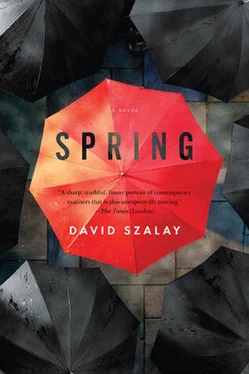The VW Golf parked in the street out front was extremely old. It had the fully depreciated feel of its two hundred thousand miles, a semi-organic hothouse smell. Some sort of shy plant life seamed the window-seals. The top of the steering wheel and the head of the stick-shift looked like they had mange. He snapped his seatbelt on and started the engine—he had had some work done on it and it fired first time.
*
Fraser was late. From the living-room window, she saw him park a scrofulous Volkswagen Golf, silver, liver-spotted with rust, in front of the house. Instead of trying the doorbell, he took out his phone.
‘Hello?’ she said neutrally.
‘Hi, it’s me. I’m outside.’
‘Okay,’ she said. ‘I’ll be down in a minute.’
She was still watching him as he produced his pack of Silk Cut and lit one. And he still didn’t look like a proper smoker; the cigarette still looked silly in his ursine hand. It had been his idea to spend a weekend together, somewhere out of London. ‘Why don’t we, uh… Why don’t we see how things stand?’ he had said. (Whatever that meant.) There was a long silence. Then she said she would think about it. She said it flippantly, without meaning it. It took her two days to see what some part of her had known all along—she would do it. It was the thing in the whole world that she most wanted to do. There was something hopeless about that. And also, she thought, staring sleeplessly out at the lobby the next morning, something uniquely hopeful.
She seemed tetchy as she slammed the front door and descended the four asphalted steps to the street with the handle of a shabby sports holdall in her fists. Smiling, he stepped forward and took it. ‘New car?’ she said.
‘Newish.’ He stowed the holdall. ‘I’ve had it six months or so. I mean, it’s not new new, of course.’
‘You’re smoking again.’
‘ ’Fraid so. Want one?’
She shook her head.
He took off his leather jacket and settled in at the wheel with enthusiasm. He seemed very pleased with himself as he turned the key.
The Golf was indeed not new new. He was talking about some work he had had done to the engine. (He knew about these things. She liked that about him. In Senegal, at Zebra Bar, he had been the unofficial onsite mechanic, spending most mornings hidden under the latest jalopy to limp into the stockade, helping hapless travellers, homme de la situation …)
The traffic was fairly light, and she did not say much as they negotiated their way out of London—Swiss Cottage, Finchley, signs for ‘the North’. She just sat strapped into the tattered passenger seat, flicking looks his way every now and then. Sometimes she would ask a simple question, and he would answer at length. For instance, ‘What sort of work are you doing at the moment?’ (A question that had its own particular intensity.)
‘Oh, this and that…’ It was mostly parties these days, he said. He would show up in his old leather jacket and jeans and spend several underdressed hours wandering around with a Nikon D70 shelved on his paunch, looking faintly seedy as he snuck canapés into his mouth and asked trios and quartets of party-goers to smile…
She was experiencing his presence as something pungently strange. It was true that they had spoken several times on the phone. Long meandering talks, mostly late at night. He would phone at eleven, midnight—she liked that. She liked the intimacy of it. She liked lying in bed, listening to his voice.
‘I miss you, Katie,’ he had said one night.
To that, she said nothing for a long time. She stared at the wicker fan.
So they had spoken a lot on the phone. To be sitting there next to him as they zoomed north, however, was a very different proposition. (He was pushing the Golf hard up the M1, squinting out intently at the motorway.) His eyes, his long jutting jaw, his hands holding the mangy wheel, his substantial forearms, his jeans—it was a very different proposition from the telephonic spirit she had been tentatively engaging with for the past week. For one thing, the telephonic spirit had no smell. His smell. His own smell, and the smell of the Davidoff scent he always used.
She had spent the night with James on Tuesday, and she had worried that that might interfere with how she felt, that it might interfere with her perception of how she felt. (An interesting idea, when she thought about it— her perception of how she felt. What was the difference between her perception of how she felt, and how she did feel? In what sense did her feelings exist when she wasn’t perceiving them—when she wasn’t feeling them?) It was not something she had planned, that last night with James. Toby had invited them for a drink, and somehow they had ended up sleeping together, and she had worried that she would find it harder to know what she felt about Fraser—and that was why she was there, on the M1 near Luton, torpedoing through a heavy squall, to work out what she felt about Fraser—so soon after spending the night with someone else.
She need not have worried. James was not in her mind at all as they tore north, water scrambling to the edges of the windscreen and peeling from the windows in long, nervous trails. What was in her mind was something else. The trouble was, this entire escapade was predicated on the idea that she had forgiven Fraser for that. The nocturnal talks might have misled her here. Somehow they seemed to have taken place in a parallel world, a world in which it had simply not happened. A world in which she had never phoned him from Madrid.
‘Where are you?’ she says, as soon as he answers.
‘I’m at home,’ he says.
‘Why haven’t you been answering the phone?’
‘What do you mean?’
‘I’ve been phoning you all morning. You haven’t been answering the phone.’
‘I didn’t hear it.’
‘I’ve been phoning you all morning …’
‘I was out.’
‘Where?’
‘The shops. Shopping…’
‘When? What time?’
‘Uh… I’m not sure. Why? What is it?’
‘Listen. You’re at home, yeah?’
‘Yeah…’
‘I’m going to call you on the landline. Okay?’ Silence. ‘Okay?’
‘I’m not at home.’
She is in Madrid—a ‘training week’—staying at her employer’s Madrid hotel. It is supposed to be a sort of prize as well as training, and there is all sorts of free pampering on offer. Now she feels light-headed and shuts her eyes. ‘You’re not at home?’ she says, without emotion.
‘No.’
‘Where are you?’ Another simple, unemotional question.
‘I’m at Nick’s place.’
‘Why are you at Nick’s place?’
‘We were out late,’ he says. ‘So I just slept on the sofa.’
‘Why did you lie to me then?’
‘I’m sorry. I don’t know. I’m sorry. It was stupid.’
‘Does Nick have a landline number?’ she says.
‘I guess.’
‘What is it?’
‘I don’t know it.’
‘Well… will you ask him?’
He hesitates. ‘Are you serious?’ When she says nothing, he sighs. ‘Okay.’
He is off the line for a minute, then he tells her the number, and she writes it down, hangs up on him, and dials it.
He picks up immediately. ‘Hello?’ he says. ‘Is that you?’
‘It’s me.’
‘Okay? Satisfied now?’
‘Why did you lie to me?’ she says, suddenly distraught. ‘Why did you do that? Don’t you understand that I want to trust you? Don’t you see that if you lie to me that’s just not going to be possible?’
‘I’m sorry. It was stupid. I’m sorry.’
‘ Don’t lie to me! Just don’t! ’
Читать дальше












